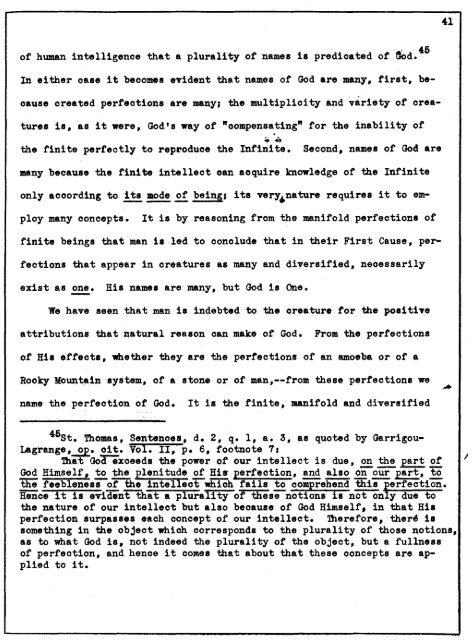Natural Knowledge of God in the Philosophy of Saint Thomas Aquina
You also want an ePaper? Increase the reach of your titles
YUMPU automatically turns print PDFs into web optimized ePapers that Google loves.
41<br />
<strong>of</strong> human <strong>in</strong>telligence that a plurality <strong>of</strong> names is predicated <strong>of</strong> 3Od. 45<br />
.<br />
.. 47<br />
In ei<strong>the</strong>r case it becomes evident that names <strong>of</strong> <strong>God</strong> are many. firBt, because<br />
created perfectionB are many; <strong>the</strong> multiplicity and variety <strong>of</strong> creatures<br />
is, as it were. <strong>God</strong>'s way <strong>of</strong> ftcompensat<strong>in</strong>gft for <strong>the</strong> <strong>in</strong>ability <strong>of</strong><br />
<strong>the</strong> f<strong>in</strong>ite perfeotly to reproduce <strong>the</strong> Inf<strong>in</strong>ite. Second, names <strong>of</strong> <strong>God</strong> are<br />
many because <strong>the</strong> f<strong>in</strong>ite <strong>in</strong>tellect can acquire knowledge <strong>of</strong> <strong>the</strong> Inf<strong>in</strong>ite<br />
only accord<strong>in</strong>g to ~~~ be<strong>in</strong>g; its very.nature requires it to employ<br />
many concepts.<br />
It is by reason<strong>in</strong>g from <strong>the</strong> manifold perfections <strong>of</strong><br />
f<strong>in</strong>ite be<strong>in</strong>gs that man i. led to conolude that <strong>in</strong> <strong>the</strong>ir First Cause, perfections<br />
that appear <strong>in</strong> creatures as many and diversified. necessarily<br />
exist as one. His names are many, but <strong>God</strong> is One.<br />
We have seen that man is <strong>in</strong>debted to <strong>the</strong> oreature for <strong>the</strong> positive<br />
attributions that ~atural reason can make <strong>of</strong> <strong>God</strong>. From <strong>the</strong> perfeotions<br />
<strong>of</strong> Hi. effect., whe<strong>the</strong>r <strong>the</strong>y are <strong>the</strong> perfeotions <strong>of</strong> an amoeba or <strong>of</strong> a<br />
Rooky Mounta<strong>in</strong> system, <strong>of</strong> a stone or <strong>of</strong> man,--from <strong>the</strong>se perfections we<br />
name <strong>the</strong> perfection <strong>of</strong> <strong>God</strong>.<br />
It is <strong>the</strong> f<strong>in</strong>ite, manifold and diversified<br />
45St• <strong>Thomas</strong>" Sentences. d. 2, q. 1, a. 3, as quoted by Ge.rrigou<br />
Lagrange • ...2,£. ~. Vol. II, p. 6. footnote 7:<br />
1hat <strong>God</strong> exceeds <strong>the</strong> power <strong>of</strong> our <strong>in</strong>telleot is due, ~ ~ part !!.!<br />
~ Himself. ~ <strong>the</strong> plenitude 2!.!!!! perfection, ~!!!2. ~ ~ part, ~<br />
~ feebleness 2!.~ <strong>in</strong>tellect whioh tailB to oomprehend ~ ierfection.<br />
Hence it is evident that a plurality <strong>of</strong> <strong>the</strong>se notions is not on y due to<br />
<strong>the</strong> nature <strong>of</strong> our <strong>in</strong>tellect but also because <strong>of</strong> <strong>God</strong> Himself. <strong>in</strong> that Hi.<br />
perfection surpasses each concept <strong>of</strong> our <strong>in</strong>tellect. 1herefore, <strong>the</strong>r~ i.<br />
someth<strong>in</strong>g <strong>in</strong> <strong>the</strong> object which corresponds to <strong>the</strong> plurality <strong>of</strong> those notions,<br />
aB to what <strong>God</strong> iB. not <strong>in</strong>deed <strong>the</strong> plurality <strong>of</strong> <strong>the</strong> object, but a fullness<br />
<strong>of</strong> perfection, and hence it comes that about that <strong>the</strong>se concepts are applied<br />
to it.<br />
I


















